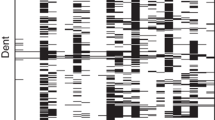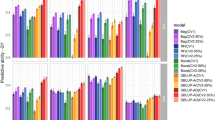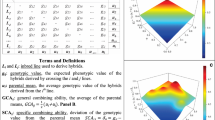Abstract
Key message
Inclusion of historical training data improved the genomics-based prediction of performance of maize hybrids, the extent depending on the phenotypic trait and genotype-by-year interaction.
Abstract
Prediction of hybrid performance using existing phenotypic data on previous hybrids combined with molecular data collected on the parent lines allows to identify the most promising candidates from a huge number of possible hybrids at an early stage. Phenotypic data on yield and dry matter of 1970 grain maize hybrids from 19 years of a public breeding program were aggregated considering the underlying structure of factorial sets of hybrids. Pedigree records and 50 K SNP data were collected on their 170 Dent and 127 Flint parent lines. The performance of untested hybrids was predicted by best linear unbiased predictors (BLUP) on basis of pedigree or genomic data. For composition of training sets (TRN) and test sets (TST), three schemes for collecting factorials from specific years were employed which resulted in 490 scenarios. For each scenario, the predictive ability and genomic relationship between TRN and TST hybrids were determined. For extended TRNs, where earlier years were successively added to the TRN, the maximum relationship increased and the predictive ability improved, with the extent of the latter depending on the phenotypic trait and its genotype-by-year interaction. Genomic BLUP outperformed pedigree BLUP and better utilized the early years’ data, especially for prediction of hybrids from factorials in a more distant future. This study on hybrid prediction in grain maize illustrated that including historical phenotypic data for training, although consisting of less related genotypes, can improve genomic prediction and enables optimization of hybrid variety development.




Similar content being viewed by others
References
Albrecht T, Auinger H-J, Wimmer V, Ogutu JO, Knaak C, Ouzunova M, Piepho H-P, Schön C-C (2014) Genome-based prediction of maize hybrid performance across genetic groups, testers, locations, and years. Theor Appl Genet 127:1375–1386. https://doi.org/10.1007/s00122-014-2305-z
Asoro FG, Newell MA, Beavis WD, Scott MP, Jannink J-L (2011) Accuracy and training population design for genomic selection on quantitative traits in elite North American oats. The Plant Genome 4:132–144. https://doi.org/10.3835/plantgenome2011.02.0007
Auinger HJ, Schönleben M, Lehermeier C, Schmidt M, Korzun V, Geiger HH, Piepho H-P, Gordillo A, Wilde P, Bauer E, Schön C-C (2016) Model training across multiple breeding cycles significantly improves genomic prediction accuracy in rye (Secale cereale L.). Theor Appl Genet 129:2043–2053. https://doi.org/10.1007/s00122-016-2756-5
Bernardo R (1994) Prediction of maize single-cross performance using RFLPs and information from related hybrids. Crop Sci 34:20–25. https://doi.org/10.2135/cropsci1994.0011183X003400010003x
Bernardo R (1996) Best linear unbiased prediction of maize single-cross performance. Crop Sci 36:50–56. https://doi.org/10.2135/cropsci1996.0011183X003600010009x
Browning BL, Browning SR (2009) A unified approach to genotype imputation and haplotype-phase inference for large data sets of trios and unrelated individuals. Am J Hum Genet 84:210–223. https://doi.org/10.1016/j.ajhg.2009.01.005
Burgueño J, de los Campos G, Weigel K, Crossa J (2012) Genomic prediction of breeding values when modeling genotype × environment interaction using pedigree and dense molecular markers. Crop Sci 52:707–719. https://doi.org/10.2135/cropsci2011.06.0299
Butler DG, Cullis BR, Gilmour AR, Gogel BJ (2009) Mixed models for S language environments: ASReml-R reference manual. Training Series QE02001. Queensland Department of Primary Industries and Fisheries, NSW Department of Primary Industries, Brisbane
Clark SA, Hickey JM, Daetwyler HD, Van der Werf JHJ (2012) The importance of information on relatives for the prediction of genomic breeding values and the implications for the makeup of reference data sets in livestock breeding schemes. Genet Sel Evol 44:4. https://doi.org/10.1186/1297-9686-44-4
Daetwyler HD, Villanueva B, Woolliams JA (2008) Accuracy of predicting the genetic risk of disease using a genome-wide approach. PLoS ONE 3:e3395. https://doi.org/10.1371/journal.pone.0003395
Duvick DN (1999) Heterosis: feeding people and protecting natural resources. In: Coors JG, Pandey S (eds) The genetics and exploitation of heterosis in crops. ASA-CSSA, Madison, pp 19–29
Ganal MW, Durstewitz G, Polley A, Bérard A, Buckler ES, Charcosset A, Clarke JD, Graner E-M, Hansen M, Joets J, Le Paslier M-C, McMullen MD, Montalent P, Rose M, Schön C-C, Sun Q, Walter H, Martin OC, Falque M (2011) A large maize (Zea mays L.) SNP genotyping array: development and germplasm genotyping, and genetic mapping to compare with the B73 reference genome. PLoS ONE 6:e28334. https://doi.org/10.1371/journal.pone.0028334
Habier D, Tetens J, Seefried F-R, Lichtner P, Thaller G (2010) The impact of genetic relationship information on genomic breeding values in German Holstein cattle. Genet Sel Evol 42:5. https://doi.org/10.1186/1297-9686-42-5
Habier D, Fernando RL, Garrick DJ (2013) Genomic BLUP decoded: a look into the black box of genomic prediction. Genetics 194:597–607. https://doi.org/10.1534/genetics.113.152207
Heffner EL, Sorrells ME, Jannink J-L (2009) Genomic selection for crop improvement. Crop Sci 49:1–12. https://doi.org/10.2135/cropsci2008.08.0512
Henderson CR (1984) Applications of linear models in animal breeding. University of Guelph, Guelph
Heslot N, Yang H, Sorrells ME, Jannink J-L (2012) Genomic selection in plant breeding: a comparison of models. Crop Sci 52:146–160. https://doi.org/10.2135/cropsci2011.06.0297
Heslot N, Jannink J-L, Sorrells ME (2013) Using genomic prediction to characterize environments and optimize prediction accuracy in applied breeding data. Crop Sci 53:921–933. https://doi.org/10.2135/cropsci2012.07.0420
Hickey JM, Dreisigacker S, Crossa J, Hearne S, Babu R, Prasanna BM, Grondona M, Zambelli A, Windhausen VS, Mathews K, Gorjanc G (2014) Evaluation of genomic selection training population designs and genotyping strategies in plant breeding programs using simulation. Crop Sci 54:1476–1488. https://doi.org/10.2135/cropsci2013.03.0195
Hofheinz N, Borchardt D, Weissleder K, Frisch M (2012) Genome-based prediction of test cross performance in two subsequent breeding cycles. Theor Appl Genet 125:1639–1645. https://doi.org/10.1007/s00122-012-1940-5
Kadam DC, Potts SM, Bohn MO, Lipka AE, Lorenz AJ (2016) Genomic prediction of single crosses in the early stages of a maize hybrid breeding pipeline. G3 G3(6):3443–3453. https://doi.org/10.1101/054015
Lehermeier C, Krämer N, Bauer E, Bauland C, Camisan C, Campo L, Flament P, Melchinger AE, Menz M, Meyer N, Moreau L, Moreno-González J, Ouzunova M, Pausch H, Ranc N, Schipprack W, Schönleben M, Walter H, Charcosset A, Schön C-C (2014) Usefulness of multiparental populations of maize (Zea mays L.) for genome-based prediction. Genetics 198:3–16. https://doi.org/10.1534/genetics.114.161943
Lorenz AJ, Smith KP (2015) Adding genetically distant individuals to training populations reduces genomic prediction accuracy in barley. Crop Sci 55:2657–2667. https://doi.org/10.2135/cropsci2014.12.0827
Ly D, Chenu K, Gauffreteau A, Rincent R, Huet S, Gouache D, Martre P, Bordes J, Charmet G (2017) Nitrogen nutrition index predicted by a crop model improves the genomic prediction of grain number for a bread wheat core collection. Field Crops Res 214:331–340. https://doi.org/10.1016/j.fcr.2017.09.024
Maenhout S, De Baets B, Haesaert G, Van Bockstaele E (2007) Support vector machine regression for the prediction of maize hybrid performance. Theor Appl Genet 115:1003–1013. https://doi.org/10.1007/s00122-007-0627-9
Maenhout S, De Baets B, Haesaert G (2010) Graph-based data selection for the construction of genomic prediction models. Genetics 185:1463–1475. https://doi.org/10.1534/genetics.110.116426
Malosetti M, Bustos-Korts D, Boer MP, Van Eeuwijk FA (2016) Predicting responses in multiple environments: issues in relation to genotype × environment interactions. Crop Sci 56:2210–2222. https://doi.org/10.2135/cropsci2015.05.0311
Massman JM, Gordillo GA, Lorenzana RE, Bernardo R (2013) Genomewide predictions from maize single-cross data. Theor Appl Genet 126:13–22. https://doi.org/10.1007/s00122-012-1955-y
Michel S, Ametz C, Gungor H, Epure D, Grausgruber H, Löschenberger F, Buerstmayr H (2016) Genomic selection across multiple breeding cycles in applied bread wheat breeding. Theor Appl Genet 129:1179–1189. https://doi.org/10.1007/s00122-016-2694-2
Möhring J, Piepho H-P (2009) Comparison of weighting in two-stage analysis of plant breeding trials. Crop Sci 49(6):1977
Patterson HD (1997) Analysis of series of variety trials. In: Kempton RA, Fox PN (eds) Statistical methods for plant variety evaluation. Chapman & Hall, London, pp 139–161
Patterson HD, Williams ER (1976) A new class of resolvable incomplete block designs. Biometrika 63(1):83–92
Pérez-Rodríguez P, Crossa J, Rutkoski J, Poland J, Singh R, Legarra A, Autrique E, de los Campos G, Burgueño J, Dreisigacker S (2017) Single-step genomic and pedigree genotype × environment interaction models for predicting wheat lines in international environments. Plant Genome 10:2. https://doi.org/10.3835/plantgenome2016.09.0089
Piepho H-P, Williams ER, Fleck M (2006) A note on the analysis of designed experiments with complex treatment structure. HortScience 41:446–452
Piepho H-P, Möhring J, Melchinger AE, Büchse A (2008) BLUP for phenotypic selection in plant breeding and variety testing. Euphytica 161:209–228
Podlich DW, Winkler CR, Cooper M (2004) Mapping as you go: an effective approach for marker-assisted selection of complex traits. Crop Sci 44:1560–1571
R Core Team (2017) R: a language and environment for statistical computing. https://www.r-project.org
Rincent R, Laloë D, Nicolas S, Altmann T, Brunel D, Revilla P, Rodríguez VM, Moreno-González J, Melchinger AE, Bauer E, Schön C-C, Meyer N, Giauffret C, Bauland C, Jamin P, Laborde J, Monod H, Flament P, Charcosset A, Moreau L (2012) Maximizing the reliability of genomic selection by optimizing the calibration set of reference individuals: comparison of methods in two diverse groups of maize inbreds (Zea mays L.). Genetics 192:715–728. https://doi.org/10.1534/genetics.112.141473
Rincent R, Charcosset A, Moreau L (2017) Predicting genomic selection efficiency to optimize calibration set and to assess prediction accuracy in highly structured populations. Theor Appl Genet 130:2231–2247. https://doi.org/10.1007/s00122-017-2956-7
Saatchi M, McClure MC, McKay SD, Rolf MM, Kim J, Decker JE, Taxis TM, Chapple RH, Ramey HR, Northcutt SL, Bauck S, Woodward B, Dekkers JCM, Fernando RL, Schnabel RD, Garrick DJ, Taylor JF (2011) Accuracies of genomic breeding values in American Angus beef cattle using K-means clustering for cross-validation. Genet Sel Evol 43:40
Schopp P, Riedelsheimer C, Utz HF, Schön C-C, Melchinger AE (2015) Forecasting the accuracy of genomic prediction with different selection targets in the training and prediction set as well as truncation selection. Theor Appl Genet 128:2189–2201. https://doi.org/10.1007/s00122-015-2577-y
Schopp P, Müller D, Wientjes YCJ, Melchinger AE (2017) Genomic prediction within and across biparental families: means and variances of prediction accuracy and usefulness of deterministic equations G3(7):3571–3586. https://doi.org/10.1534/g3.117.300076
Schrag TA, Melchinger AE, Sørensen AP, Frisch M (2006) Prediction of single-cross hybrid performance for grain yield and grain dry matter content in maize using AFLP markers associated with QTL. Theor Appl Genet 113:1037–1047
Schrag TA, Möhring J, Maurer HP, Dhillon BS, Melchinger AE, Piepho H-P, Sørensen AP, Frisch M (2009) Molecular marker-based prediction of hybrid performance in maize using unbalanced data from multiple experiments with factorial crosses. Theor Appl Genet 118:741–751
Schrag TA, Westhues M, Schipprack W, Seifert F, Thiemann A, Scholten S, Melchinger AE (2018) Beyond genomic prediction: combining different types of omics data can improve prediction of hybrid performance in maize. Genetics 208:1373–1385. https://doi.org/10.1534/genetics.117.300374
Schulz-Streeck T, Ogutu JO, Gordillo GA, Karaman Z, Knaak C, Piepho H-P (2013) Genomic selection allowing for marker-by-environment interaction. Plant Breed 132:532–538. https://doi.org/10.1111/pbr.12105
Seifert F, Thiemann A, Schrag TA, Rybka D, Melchinger AE, Frisch M, Scholten S (2018) Small RNA-based prediction of hybrid performance in maize. BMC Genom 19:371
Smith A, Cullis B, Thompson R (2001) Analyzing variety by environment data using multiplicative mixed models and adjustments for spatial field trend. Biometrics 57(4):1138–1147
Sukumaran S, Crossa J, Jarquín D, Reynolds M (2017) Pedigree-based prediction models with genotype × environment interaction in multienvironment trials of CIMMYT wheat. Crop Sci 57:1865–1880. https://doi.org/10.2135/cropsci2016.06.0558
Technow F, Schrag TA, Schipprack W, Bauer E, Simianer H, Melchinger AE (2014) Genome properties and prospects of genomic prediction of hybrid performance in a breeding program of maize. Genetics 197:1343–1355. https://doi.org/10.1534/genetics.114.165860
VanRaden PM (2008) Efficient methods to compute genomic predictions. J Dairy Sci 91:4414–4423. https://doi.org/10.3168/jds.2007-0980
Wedzony M, Forster B, Zur I, Golemiec E, Szechynska-Hebda M, Dubas E, Gotebiowska G (2009) Progress in doubled haploid technology in higher plants. In: Touraev A, Forster BP, Jain SM (eds) Advances in haploid production in higher plants. Springer, Dordrecht, pp 1–33
Westhues M, Schrag TA, Heuer C, Thaller G, Utz HF, Schipprack W, Thiemann A, Seifert F, Ehret A, Schlereth A, Stitt M, Nikoloski Z, Willmitzer L, Schön C-C, Scholten S, Melchinger AE (2017) Omics-based hybrid prediction in maize. Theor Appl Genet 130:1927–1939. https://doi.org/10.1007/s00122-017-2934-0
Acknowledgements
We thank the staff of the Agricultural Experimental Research station, University of Hohenheim, for excellent technical assistance in conducting the field experiments, H. P. Piepho and H. F. Utz for their advice on the statistical analyses as well as W. Molenaar and two anonymous reviewers for valuable suggestions to improve the content of the manuscript. We are indebted to the group of R. Fries from Technische Universität München for the SNP genotyping of the parent inbred lines. This project was funded by the German Federal Ministry of Education and Research (BMBF) within the projects OPTIMAL (FKZ: 0315958B, 0315958F), SYNBREED (FKZ: 0315528D) and by the German Research Foundation (DFG, Grant No. ME 2260/5-1).
Author information
Authors and Affiliations
Corresponding author
Ethics declarations
Conflict of interest
The authors declare that they have no conflict of interest.
Additional information
Communicated by Laurence Moreau.
Electronic supplementary material
Below is the link to the electronic supplementary material.
Rights and permissions
About this article
Cite this article
Schrag, T.A., Schipprack, W. & Melchinger, A.E. Across-years prediction of hybrid performance in maize using genomics. Theor Appl Genet 132, 933–946 (2019). https://doi.org/10.1007/s00122-018-3249-5
Received:
Accepted:
Published:
Issue Date:
DOI: https://doi.org/10.1007/s00122-018-3249-5




